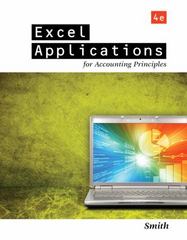Question
Blake Koepka's goal has always been to design the finest putters for the best golfers in the world. Blake's latest invention is the Happy Gilmore,
Blake Koepka's goal has always been to design the finest putters for the best golfers in the world. Blake's latest invention is the "Happy Gilmore," a triangular-shaped mallet-style putter that has the highest moment of inertia of any putter ever made. The putter, which is milled from aircraft-quality aluminum and tungsten, has a substantial amount of mass located several inches behind the putter face, giving it a deep center of gravity. This deep center of gravity makes the Gilmore very stable and forgiving, which should help the golfer make more putts. Prior to the start of the year, Blake's management team developed the following budget for the Gilmore:
Sales and production (# of putters)5,500
Sales price per putter$270
Variable materials cost per putter:
Aluminum and weights (per putter head) - 1,000 grams @ $0.055 per gram$55
Shaft (steel) - 1 per putter @ $9.00$9
Grip - 1 per putter @ $12.00$12
Variable labor costs (3 hours per putter @ $20 per hour)$60
Fixed costs per unit (based on budgeted production)$70
Upon seeing these figures, Blake wondered if there was a way to increase his company's profit from the Gilmore putter.
Blake had two ideas for further changes in the coming year (these changes are not reflected in the budget above):
1)increase the selling price to $295 per putter, and
2)rent a new milling machine.
The milling machine rental would cost Blake $65,000 in fixed costs for the year, but he expected the new machine to reduce the labor time associated with making each putter. He also expected the new machine to reduce materials waste - although each finished putter head weighs only 350 grams, the production process using existing equipment involves 650 grams waste (1,000 grams - 350 grams) of aircraft-quality aluminum and tungsten.
Blake implemented both of his ideas and actual results for the year were as follows:
Sales and production (# of putters)4,950
Sales price per putter$295
Materials cost per putter:
Aluminum and weights (for putter head) - 600 grams @ $0.07 per gram$42
Shaft (steel) - 1 per putter$9
Grip - 1 per putter$14
Labor costs per putter (13,500 total hours @ $20/hour for all putters produced)$52
Fixed costs (for the year)$440,000
1.)Determine a) static budgeted profit based on the original expected sales volume, b) flexible budgeted profit based on the actual sales volume, and c) actual profit. Be sure your results include a line for revenue and a line for each cost item.
2.)For total profit, calculate the static budget variance, flexible budget variance, and sales-activity variance. Be sure to indicate whether the variance is favorable or unfavorable. Explain what each of these profit variances represents. Be specific.
3.)What would have been the effect on total profit of increasing the selling price to $295? The smaller sales volume was entirely due to the higher price. For this calculation of the effect of higher selling price, assume that cost behavior for fixed costs and variable cost per unit remained as specified in the budget prepared before the end of the year.
4.)Calculate and explain the variances that would help Blake assess whether renting the new milling machine reduced material waste and labor time required to produce putters, and whether renting the milling machine increased total profit during the year.
Step by Step Solution
There are 3 Steps involved in it
Step: 1

Get Instant Access to Expert-Tailored Solutions
See step-by-step solutions with expert insights and AI powered tools for academic success
Step: 2

Step: 3

Ace Your Homework with AI
Get the answers you need in no time with our AI-driven, step-by-step assistance
Get Started


